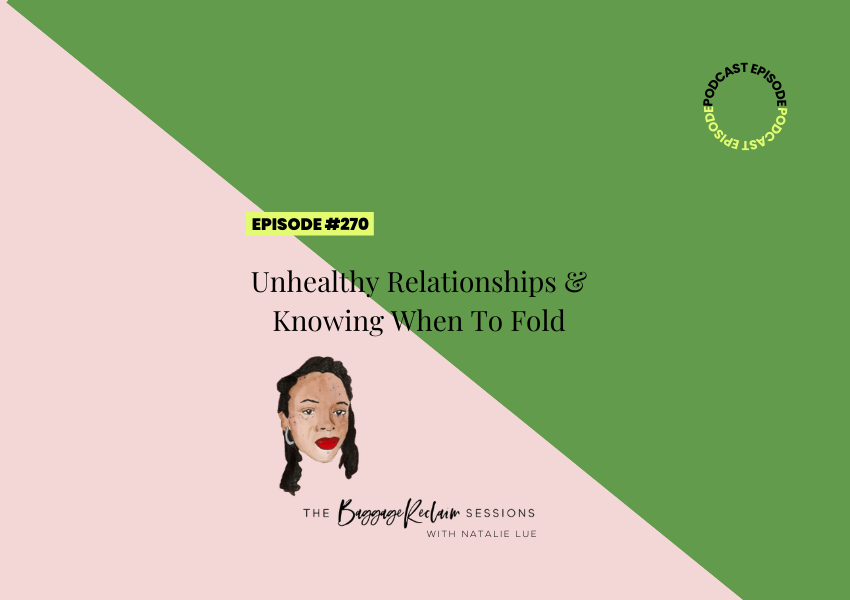In this week’s episode of The Baggage Reclaim Sessions, I talk about unhealthy and unhealthy relationships and knowing when to fold even though we might feel very invested. What stops us from stepping away? How does focusing on good points and good times create blind spots that keep us stuck? Ultimately, we need to recognise where we’re constantly fighting for a relationship instead of being in and enjoying it.
Subscribe on Apple Podcasts | Spotify | Android
5 key topics in this episode
- Unhealthy and unfulfilling relationships can manifest in a variety of ways, but they tend to include some or even all of the following:
- Chronic emotional unavailability, including dodging intimacy and commitment
- Lack of mutuality and love, care, trust and respect
- One or both parties are being less not more of who they really are.
- The relationship destabilises instead of regulates
- Shady and abusive. e.g. emotionally, verbally and/or physically abusive, excessive concern and bandwidth used on control, power, gaining status, etc
- Being in the relationship for the wrong reasons
- Stuck in patterns
- One of the reasons we struggle to call it quits with an unhealthy relationship is that we don’t actually want to end the relationship. What we want is for the unwanted, possibly abusive or certainly very problematic behaviour to stop. We also do stuff like betting on potential, focusing on connection and chemistry, trying to get a return on investment, saying that we’re staying “for the kids”, and going round and round with circular issues.
- A common relationship stumbling block is the misconception that how willing we are to fight for a relationship is a measure of how much we love the person or the viability of the relationship. In reality, it may well be that the persistence and unwillingness to down tools and call time on the relationship reflects our emotional baggage.
- When we perceive the going to be good or we want to plow ahead with our vision of things, we’ll override any concerns we have and focus on good points. Yet the moment we experience anxiety and tension or things aren’t going as we’d like, those buried or acknowledged concerns come to the forefront.
- If, in order for the relationship to work, the person has to fundamentally change who they are (or we have to lose ourselves) the relationship isn’t healthy and it’s not going to work. It doesn’t have mutual love, care, trust and respect.
Links mentioned + recommended resources
- The Compatibility Factor (ep 209)
- Why we’re attracted to emotionally unavailable partners who are like our parents
- Key Signs of Emotional Unavailability (ep 124)
- What is intimacy? (ep 203)
- ‘Getting’ Commitment (ep 142)
- Do people change after saying they’re not ready for (or don’t want) commitment?
- Mr Unavailable and the Fallback Girl
- ‘Mutual’ is a Mentality (ep 237)
- Love, Care, Trust and Respect
- 11 Signs You’re in the Wrong Relationship and That It’s Time to Break Up
- Do More ‘Reps’ of Being Yourself (ep 266)
- Recognising Healthy Interactions and Relationships (There’s a simple way to do it)
- The Emperor DOESN’T Have Any Clothes On – Let’s Talk About Gaslighting (ep 185)
- Using Code Amber and Code Red Alerts To Be More Boundaried (ep 197)
- Getting Truthful About Your Intentions
- Getting to know others involves acknowledging their consistent patterns
Subscribe and/or leave a review on Apple Podcasts (how-to guide here). It really helps in growing the show! If you’re new to podcasts, find out more about what they are and how to subscribe with this handy guide.

 Add to favorites
Add to favorites 
